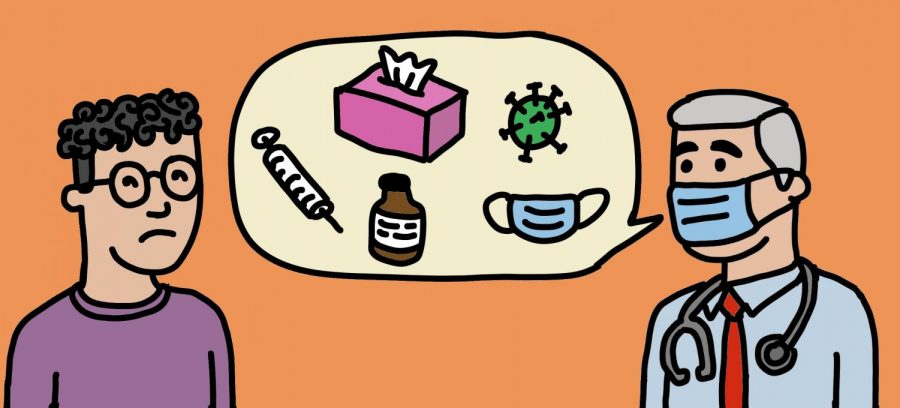Another tragedy of COVID-19: The politicization of science
September 23, 2020
The American public has always had a testy history with scientific inquiry, and as with many other exogenous geopolitical and natural pressures, COVID-19 has only served to exacerbate many of our country’s lingering social, economic and political problems. In April of this year, I wrote a piece in The Bucknellian about how social media platforms knowingly benefit from the spread of misinformation regarding the COVID-19 crisis. Much has changed since then and, unsurprisingly the public’s perception of science, in general, has been another casualty of the pandemic.
The first blow to the public’s trust in science is that no clear, apolitical figurehead emerged to direct the nation’s response to the crisis. National Institute of Health Director Dr. Anthony Fauci was an obvious candidate to lead us through this cataclysm, but conflicting information repeatedly reported by President Trump, Vice President Pence and other doctors served to divide our understanding of the virus along stark political lines. The media latched onto this, and we saw the public gleaning their information from “competing” sources such as the Centers for Disease Control and Prevention (CDC), the World Health Organization (WHO), President Trump, Fauci, their governors and so on. An early September poll from the nonpartisan Kaiser Family Foundation showed that only about two-thirds of adults trust Fauci and the CDC at least a “fair amount” for COVID-19 information. This compares with 51% for Democratic presidential nominee Joe Biden and 40% for Trump.
While a supermajority is surely impressive, no one has gained the overwhelming support necessary to firmly unify the nation in the fight against this pandemic. As a result, the lack of authoritative sources espousing reliable information still allows almost 25% of Americans to falsely believe that hydroxychloroquine is an effective treatment for COVID-19, and 20% to falsely believe that wearing a face mask is “harmful to your health.”
Another part of this decline in trust can be attributed to the “switch” on the stance on mask-wearing. In March and April, many were concerned about healthcare workers not having the disposable, surgical cloth face masks that they need to properly treat COVID-19 patients. In the midst of the general public purchasing disposable masks in large quantities (as well as toilet paper), government officials advised the public not to purchase them. The flip-flop, as many Americans feel, came when governors and the federal government later said that cloth face masks are necessary. This is not only due to the alleviation of shortage concerns, but also the increased understanding that the virus is primarily transmitted through talking, singing, and shouting, as opposed to contaminated surfaces.
This guidance on masks is not a change, instead of a more accurate understanding due to new information. Such is the nature of science: the model that we work within human terms is often only a vaguely true representation of the real world. Our current research indicates that masks are safe and effective. Many who oppose the wearing of masks, or are suspicious of the “switch,” are either not aware of or cast doubt on at least one of these facts.
Another factor that’s seeding public mistrust of science is talks for vaccine creation on an unprecedented timescale. The entire genome of 2019-nCoV was not sequenced until January of this year, and top-level government officials have publicly bickered about the availability of vaccines. Putting aside just how unhelpful that public discord is, as a result, 61% of Americans are at least “somewhat worried” that the U.S. Food and Drug Administration (FDA) (who oversees U.S. vaccines) will rush to develop a vaccine due to “political pressure.” Interestingly, Republicans, who believe that the FDA is less likely to be pressured than Democrats, are also significantly less likely than Democrats to get that vaccine if it is free and available on election day.
It almost seems that the pro-science camp is perfectly politically opposed to the more suspicious “don’t wear a mask / drink the Kool-Aid” camp. This near-universal political polarization of the virus is something that seems to be unique to America, and amid the election year, it’s unfortunately not a surprise.
To most Americans, it’s a tautology to say that all politicians lie, just as to say all bachelors are unmarried or all triangles have three sides. And, when over 85% of Republicans and Democrats each trust their respective presidential nominees more than Fauci or the CDC for COVID-19 related information, it’s obvious to see what engenders public mistrust.
We must trust science through this crisis. While it is messy, while it can seem back and forth, it is our primary (and arguably, only) weapon against this disease that has 200,000 American lives. Our lawmakers need to say that they trust Fauci and the CDC, while still giving them the proper checks to ensure that they are doing their job accurately. We need to properly dispel rumors and conspiracy theories so that Americans are informed and can speak intelligently on this crisis. All of these things are necessary so that we can focus on getting America healthy and reopen, as soon as safely possible.





















